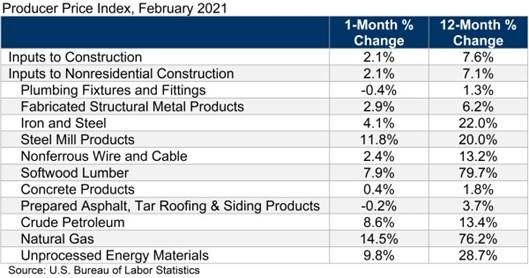Construction Input Costs and Overall Inflation on the Rise:
With fiscal stimulus checks hitting bank accounts across the United States this month and tax refunds rolling in, we have our eyes on construction input inflation, as well as inflation in the broader economy. Earlier this month, Associated Builders and Contractors reported that nonresidential construction input prices increased 2.1% for the month of February 2021. Nonresidential construction inputs have increased 7.1% since last February. Construction input inflation shows no signs of slowing. On a macroeconomic level, with the enormous stimulus package payments underway, inflation expectations in the broader economy have risen from 1.6% just five months ago to 2.3% today.

“As vaccinations become more pervasive around the world, additional stimulus is injected into various economies, and the global economy reopens in earnest, the pace of price increases could further accelerate.”
ABC Chief Economist Anirban Basu: https://www.abc.org/News-Media/News-Releases/entryid/18608/monthly-construction-input-prices-rise-2-1-in-february-says-abc
Price Escalation Clauses:
Price escalation clauses are essential to protecting yourself against accelerating construction material costs. When your suppliers aren’t holding prices, you have to pad estimates to mitigate against input risks on fixed price contracts, but last year and this year we saw instances where padded bids and contingency funds were inadequate to protect against lumber increases. A savvy owner should understand that accepting allowances or escalation clauses will get them better pricing and results through more competitive bids and more cooperative contractors. A very savvy owner might ask their contractor for a de-escalation provision to lower the price if the cost of materials decreases, which is a tradeoff a contractor might be willing to take if the owner is holding the inflation risk. If an owner won’t agree to a straight escalation clause shifting the specified input increases to them, they might still be open to an escalation clause that is only triggered after a specified input increases over a certain percentage, say 10%. This option least provides a backstop against out of control price increases.
Below are some example escalation clauses that you might consider:
“If, during the performance of this contract, the price of an input significantly increases, the price of shall be equitably adjusted by an amount reasonably necessary to cover any such significant price increases. As used herein, a significant price increase shall mean any increase in input price exceeding ____% experienced by contractor from the date of the contract signing. Such price increases shall be documented through quotes, invoices, or receipts. Where the delivery of is delayed, through no fault of contractor, as a result of the shortage or unavailability of an input, contractor shall not be liable for any additional costs or damages associated with such delay(s).” Source: Candels on Call. Another example that could work with some modification is an escalation clause that has been adopted by the National Association of Home Builders. See escalation clause here: https://www.nahb.org/-/media/NAHB/advocacy/docs/legal-issues/construction-liability/trending-now/escalation-clause-specified-building-materials-2018.pdf
If you can obtain a supply bond from your material supplier, you will also find benefits in terms of locked in pricing and prioritized delivery when supply chains break down.
Here at Florida Surety Bonds, we are committed to providing meaningful information and actionable advice to our valued customers. We go beyond bonding and create true partnership with our customers.

